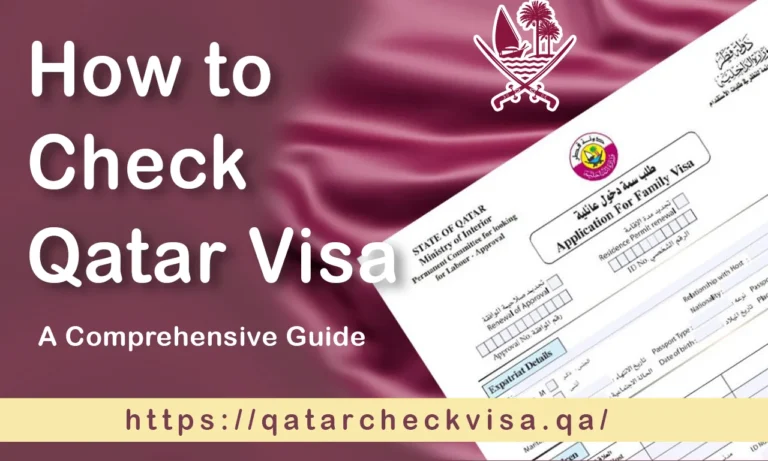Qatar Visa Medical Rejection Reasons | Complete Solutions

The very significant step of getting a Qatar visa has to be completed by expatriates who intend to work, live, or visit the country. One component that is mainly demanded for many kinds of visas is the passing of a medical examination.
Qatar gives high priority to the health of the general public thus, the visa medical test is performed to ensure that incoming foreigners do not carry diseases that may be transmitted to the local population.
It is a pity that some people do not pass the medical test.
Getting to know the usual causes of medical rejection may assist applicants in preparing to avoid possible problems. This article explores the main reasons why Qatar visa medical forms are not successful and how to successfully deal with the situation.
What Is the Qatar Visa Medical Test?
A Qatar visa medical test: is a compulsory health screening process administered in the country, as well as to ensure that new residents and workers are not having any communicable diseases or severe health issues. The medical test usually includes:
6 Common Reasons for Qatar Visa Medical Rejection
1. Infectious Diseases
The top reason for medical examination failure in Qatar is being tested positive for infectious diseases including the following:
2. Respiratory Conditions
The medical check’s chest X-ray is a section of the test that is there to detect respiratory diseases. The following failures in the patients’ health may subject them to ineligibility:
3. Other Serious Health Conditions
Although they account for a small proportion of all cases, various serious health conditions might lead to rejection if they are perceived a public health risk or a work-related safety issue. These are:
4. Neurological or Psychiatric Conditions
Severe neurological or psychiatric disorders including epilepsy or untreated schizophrenia might be the reason why applicants fail a medical test. The conditions can be considered as a safety issue that can occur especially in the workplace.
5. Substance Abuse
Drug testing is also one of the medical examinations for some of the visa categories. Visa applicants with a drug abuse history or those who tested positive for illicit drug use probably will be denied.
6. Pregnancy (in Certain Cases)
In the case of women applicants, pregnancy may not lead to the rejection of the visa but the whole process could be delayed. For example, employment visas for riskier occupations may necessitate extra medical checks on the part of the employer
How to Minimize the Risk of Qatar Visa Medical Rejection
Whether this is a potential reason why the site rejects your file, it’s still only half the battle. Your own disregarding of unapproved mistakes will help you increase your chances of passing your medical test:
Undergo a Pre-Medical Test
Actually, it is a preferable choice to undertake treatment in your home country if you have plans to apply for a Qatar visa. This gives a chance to treat the diseases if there are any before the official medical test for a visa.
Read also: How Can I Enter Qatar With Expired QID?
Get Vaccinated
The risk of a deadly disease like hepatitis B which can lead to rejection is much lower if the vaccine is given. If it looks like you are unvaccinated in your past medical record, then to get the recommended vaccines in advance can cut the chances.
Seek Treatment for Contagious Diseases
If you suffer from any communicable diseases like tuberculosis or hepatitis, make sure to get yourself treated and procure a doctor’s certificate that confirms that the condition is cured or that you are not contagious.
Manage Chronic Illnesses
Make sure that chronic conditions like diabetes or hypertension are properly managed and the follow-up care is well documented. Bring a letter from your doctor which explains your treatment plan. This could be useful.
Avoid Substance Use
Avoid any kind of drug use, including recreational drugs, before the test. In Qatar, drug use is not at all tolerated and even prescription medication misuse can turn out to be a problem.
What Happens If You Fail the Qatar Visa Medical Test?
Although it is sad to fail the medical examination, your dreams of a Qatar visa might still be alive. Here’s what you can do:
Qatar’s Medical Rejection Policies: FAQs
Final Thoughts
Qatar visa medical test is of vital importance as it is the only indicator of the country’s public health standards. Although rigorous, however, being ready and informed will help you to a great extent to clear it. Through the identification of the frequent cases of medical rejection and acting proactively, you can proceed with the procedure with confidence.
Applying for a Qatar visa? Strengthen your health and check compliance with medical requirements first! This way, you will not only issue your visa easily but also open up many other doors for your healthy and successful life in Qatar.


![How to Perform a Moi Qatar Visa Check: Complete Guide [2024]](https://qatarcheckvisa.qa/wp-content/uploads/2024/06/Qatar-Visa-Check-by-Passport-Number-1-768x461.webp)



![Qatar Family Visit Visa: A Comprehensive Guide [2024]](https://qatarcheckvisa.qa/wp-content/uploads/2024/06/Qatar-Family-Visit-Visa-768x461.webp)